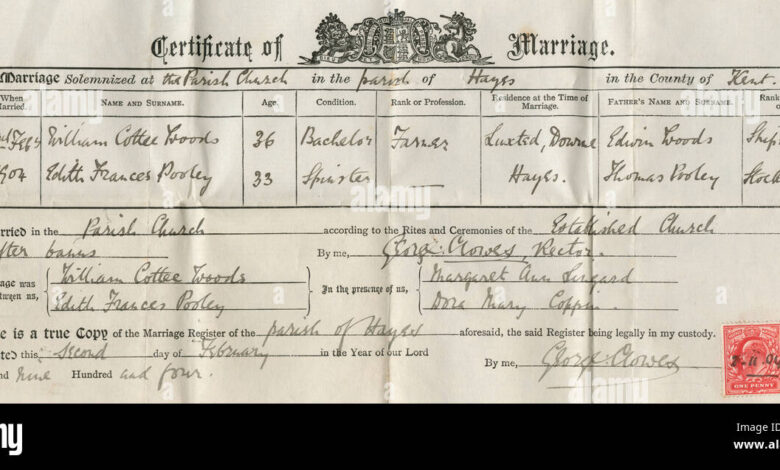Your Guide to Obtaining a Church Marriage Certificate

Church marriage certificates hold a profound significance in the realm of matrimony, bridging the spiritual and legal aspects of union. These certificates not only symbolize the commitment between two individuals but also serve as tangible evidence of a sacred covenant witnessed by their community of faith. Understanding the depth of significance and navigating the process of obtaining a church marriage certificate is essential for couples embarking on their journey toward marital bliss.
Understanding Church Marriage Certificates
A church marriage certificate is more than just a piece of paper; it embodies the sacred bond between two individuals united in matrimony within the sanctity of their chosen faith tradition. Unlike civil marriage certificates, which primarily serve legal purposes, church marriage certificates hold both religious and cultural significance. They often feature intricate designs, religious symbols, and personalized details, reflecting the uniqueness of each couple’s union and the traditions of their faith community.
In addition to serving as a testament to the couple’s commitment before their chosen deity, church marriage certificates may also carry symbolic rituals and blessings performed during the marriage ceremony. These rituals vary widely depending on the religious denomination and cultural customs but often include prayers, blessings, and the exchange of vows in the presence of clergy and witnesses.
The Role of Church Marriage Certificates in Modern Society
In today’s diverse society, where cultural and religious traditions intersect, church marriage certificates play a pivotal role in affirming the spiritual and cultural identity of couples. Beyond their religious significance, these certificates hold practical value in various aspects of life, including legal documentation, family heritage, and social recognition.
Couples who choose to obtain a church marriage certificate not only affirm their commitment within their faith community but also signal their adherence to timeless traditions and values passed down through generations. Moreover, the public declaration of love and commitment witnessed by family and friends during the marriage ceremony reinforces the social bond between the couple and their community, fostering a sense of belonging and support that transcends the bounds of matrimony.
Types of Church Marriage Certificates
Church marriage certificates come in various forms, reflecting the diversity of religious denominations and cultural traditions worldwide. From ornate and traditional designs to minimalist and contemporary styles, these certificates offer couples the opportunity to customize and personalize their documentation according to their preferences and beliefs.
In some denominations, such as Catholicism and Orthodox Christianity, church marriage certificates may adhere to specific templates prescribed by ecclesiastical authorities, ensuring consistency and authenticity across ceremonies. These certificates often feature religious imagery, scripture verses, and the official seal of the church, attesting to the validity of the marriage within the context of faith.
Conversely, in more liberal or non-denominational settings, couples may have greater freedom to design their own marriage certificates, incorporating elements that resonate with their personal beliefs and aesthetic preferences. From handcrafted calligraphy to digital illustrations, the possibilities for customization are endless, allowing couples to infuse their certificate with sentimental value and symbolism unique to their love story.
Process of Obtaining a Church Marriage Certificate
The journey toward obtaining a church marriage certificate begins long before the wedding day, requiring careful planning, communication with clergy, and adherence to specific requirements set forth by the religious institution. While the exact process may vary depending on the denomination and local customs, certain steps are common across most faith traditions.
Preparatory Steps
Before embarking on the process of obtaining a church marriage certificate, couples are typically required to undergo pre-marital counseling or instruction, which serves as a foundation for building a strong and enduring marital relationship. This counseling may cover a range of topics, including communication skills, conflict resolution, financial management, and the spiritual dimensions of marriage.
Documentation Needed
In addition to completing pre-marital counseling, couples must gather the necessary documentation required by their chosen religious institution. This typically includes valid identification documents, such as passports or driver’s licenses, as well as any certificates or affidavits attesting to the completion of pre-marital counseling or instruction.
Application Procedure
Once the requisite documentation is in order, couples can proceed with the application process for their church marriage certificate. This typically involves filling out a marriage application form provided by the religious institution and submitting it along with any required fees or donations.
Scheduling the Ceremony
After the application is approved, couples can work with their clergy or religious officiant to schedule the date and time for their marriage ceremony. Depending on the availability of the church or religious venue, couples may need to book their preferred date well in advance to ensure availability.
The Ceremony: Symbolism and Rituals
The marriage ceremony itself is a sacred and joyous occasion, filled with symbolism, rituals, and blessings that reflect the spiritual significance of the union. From the exchange of vows to the pronouncement of marriage by the officiant, each aspect of the ceremony holds deep meaning and resonance within the context of faith.
Exchange of Vows
Central to the marriage ceremony is the exchange of vows, where the couple publicly declares their commitment to each other before their chosen deity and community of faith. These vows may be traditional, recited from religious texts, or personalized to reflect the unique bond between the couple.
Religious Rituals Incorporated
Throughout the ceremony, various religious rituals and blessings may be incorporated, depending on the traditions of the denomination or cultural customs of the couple. These rituals may include the lighting of candles, the sharing of communion, or the recitation of prayers and blessings by clergy or officiants.
Witnessing and Commemoration
As witnesses to the marriage vows exchanged, family and friends play a vital role in affirming and celebrating the union of the couple. Their presence not only adds to the joyous atmosphere of the ceremony but also bears witness to the sacred covenant established between the couple and their faith community.
After the Ceremony: Certificate Issuance Process
Following the exchange of vows and pronouncement of marriage, the final step in obtaining a church marriage certificate is the issuance and signing of the certificate by the officiant and witnesses. This process serves as official documentation of the marriage within the context of faith and is a tangible reminder of the sacred covenant established between the couple.
Verification of Ceremony Completion
Before the certificate can be issued, the officiant or clergy member responsible for conducting the ceremony must verify that all requirements have been met and that the marriage vows were exchanged according to the customs and traditions of the religious institution.
Signing by Officiant and Witnesses
Once the ceremony is complete and all necessary documentation has been verified, the officiant and witnesses will sign the church marriage certificate, attesting to the validity of the marriage and their presence as witnesses to the union.
Timelines for Receiving the Certificate
The timeline for receiving the church marriage certificate may vary depending on the administrative processes of the religious institution and any additional requirements for authentication or verification. In some cases, couples may receive the certificate immediately following the ceremony, while in others, there may be a waiting period of several days or weeks.
Legal Recognition and Authentication
While church marriage certificates hold profound religious and cultural significance, they may not always carry legal validity in the eyes of the law. Unlike civil marriage certificates, which are recognized and regulated by governmental authorities, church marriage certificates derive their validity from the religious institution that issues them.
Understanding Legal Validity
In many jurisdictions, church marriage certificates are not sufficient on their own to establish the legal validity of a marriage for purposes such as taxation, inheritance, or immigration. Instead, couples may be required to obtain a separate civil marriage license or certificate from the appropriate governmental authority




